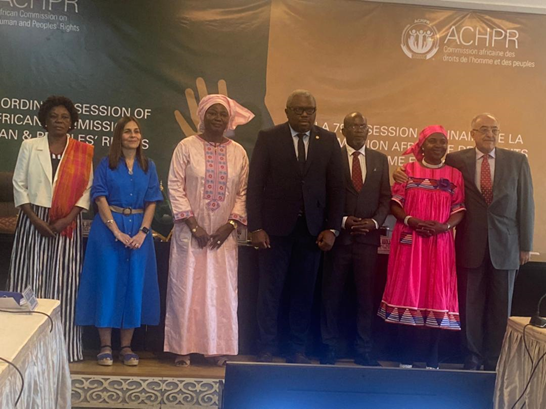By: Kebba AF Touray
The African Commission on Human and Peoples Rights (ACHPR) on Tuesday, 14 May, 2024, commenced its 79th Ordinary Session, currently underway in Banjul, The Gambia.
The Theme of the session is “Educate an African Fit for the 21st Century: Building Resilient Education Systems for Increased Access to Inclusive, Lifelong, Quality, and Relevant Learning in Africa.”
Speaking at the opening ceremony, Mrs. Hannah Forster, Executive Director of African Center for Democracy and Human and People’s Rights Studies (ACDHPRS), said the just concluded forum on the participation of NGOs on Human Rights featured a total of 11 panel discussions.
She added that it also featured the panel by special interest groups, discussing critical aspects of education and its intersection with diverse aspects of the education system, human rights, discrimination and other important issues.
The panel, she said, looked at an overview of human rights and democracy in Africa, gender based violence and harmful traditional practices, with a focus on FGM in Africa.
“We also looked at the barriers to education in Africa, civic engagement and freedom of assembly in which we tried to review the democratic participation of human rights defenders in Africa,” she said.
She continued that election was also on the agenda, as it is the protocol to the African Charter on Human and Peoples Rights on specific aspects of the rights to a nationality and the eradication of statelessness in Africa.
She said that the forum also reiterated the importance of addressing discrimination in various African countries, including social discrimination, occupational discrimination, leading to limited access to education, limitations to livelihoods among other services was highlighted.
“It was also the barriers to access education in rural Africa, confounded by conflicts, extremist activity, activist activities and cultural challenges demand our immediate action and collective results because it is imperative that we heed the clarion call to address the barriers confronting educational access in Africa, comprehensively and urgently as we delve into the pressing issues of civic education, freedom of assembly and the protection of human rights defenders
She also spoke of the need to remember the sacrifices made by those on the frontlines of the fight for justice and dignity, saying “their voices must be heard, their rights must be protected, and their courage must inspire us to redouble our efforts in the pursuit of a more just and equitable Africa”.
Joseph Whittal, Chairperson, Network of African National Human Rights Institutions (NANHRI), said that education stands as a fundamental pillar for sustainable development and it empowers eradicating poverty.
“It serves as a cover for innovation, driving economic growth and social progress across diverse segments, while nurturing creativity and problem solving skills. Education equips individuals with the tools they need to thrive in an evolving landscape,” he said, while delving on the significance of education as the theme of this year’s session.
“As we navigate the complexities of ascension, investment in education becomes not just a necessity, but a strategic imperative for unlocking the full potential of our people and our continuing education as our compass which are the costs towards a future where everyone has the opportunity to thrive, contribute or participate in sustainable development across Africa,” he said.
EU Special Representative for Human Rights, H. E Olof SkooG, said the union places human rights at the center of their policies, both nationally and globally, as it is a precondition to achieve inclusive and sustainable development.
He lamented that the world is backsliding on the sustainable development goals and “the global resurgence of authoritarianism, shrinking civic spaces, growing intolerance, economic hardships, social inequalities and escalating disinformation campaigns are among the many challenges that pose a grave threat to the kind of world that we strive for and what we represent.”
He stated that global tensions are growing, as well as the sheer number of conflicts that put aside the most fundamental principles of humanity and civility.
“All of these challenges require joint and coordinated efforts by all of us to understand human rights and dignity at the center of our mission. In these difficult times, we need more than ever to stick together and build strong partnerships in order to protect the fundamental and universal rights of our people nationally, regionally and globally,” he said.
The Gambia’s Foreign Affairs Minister, Momodou Tangara, told the convergence: “We all share a common commitment towards human rights, as heart and core of every thriving democracy is respect for human rights.”
He said upon the completion of its work, the TRRC, he said submitted its report to the President, which contains a wide range of findings, a white paper and recommendations, towards addressing the legacy of past human rights violations.
The government, he said, is willing and committed to ensure the implementation of the recommendations of the TRRC.


















